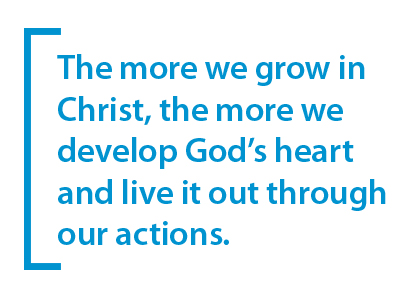Christmas is the giving season. It is the time of the year when the giving catalogues that come through Canada Post or email tug at our hearts with the circumstances of those who have less and, perhaps, by the awareness that we have more than we need. There is a strong message – in churches, charitable institutions and even in the news – that no one should have to do without at Christmas.
At Christmas, we also feel the tug of expectations, year-end fundraising campaigns and the desire to feel good about giving.
I want to take a different approach to giving as we prepare for this season.
What is the greatest single discipleship tool available to us? Money. That’s right; you heard me. Money.
Okay, “greatest single tool” may be a bit of an exaggeration, but before you stop reading, consider this. What is one thing that we look to for independence, power, security, self-worth, self-determination, significance and so on? For most people, it’s money.
We live in a culture that places value on material wealth. As Christ followers, we know that the heart of God is to give. One of the first passages Christ followers often learn is John 3:16: “For God so loved the world he gave his one and only Son…”
The heart of God is to give which means generosity reflects the Father’s heart. The more we grow in Christ, the more we develop God’s heart and live it out through our actions.
Notice that John does not give any explanation for God’s generosity other than to say it was motivated by God’s love for humanity. God did not give because humanity would respond. God did not give because of anything we did, would do or could do. God did not give because it was good stewardship or because he would receive a good “return on his investment.”
God loved, so he gave.
The heart of God the Father is to be generous. That is his nature. As his children, we are invited to live as he does.
But we have a problem living like our Father. How do I know? Statistics and
my own heart.
This conversation illustrates the gap between our intentions and our actions:
A pastor asked his farmer friend, “If you had 100 horses, would you give me 50?”
“Certainly,” the farmer answered.
The pastor asked, “If you had 100 cows, would you give me 50?”
“Yes,” the farmer said.
Then the pastor asked, “If you had two pigs, would you give me one?”
The farmer replied, “Now cut that out, pastor; you know I have two pigs!”

How do I know? In Statistics Canada’s 2015 information on charitable giving, Steinbach and Abbotsford top the charts with 6.6 percent and 2.7 percent respectively. Giving 10 percent of our income has become the high-water mark for Christian giving when, in fact, it ought to be the base figure. To paraphrase St. Augustine: “If you’re not going to give, then tithe.”We are generous in principle, generous in theology, generous in our intentions, generous in our emotions, but not always so generous in our actions.
Christ followers could turn the world upside-down in short order if we would do the thing that we all know we are called to do: give. Be generous like our Father is generous.
I have found the practice of generosity in general, and financial generosity specifically, to be more challenging, more transformative, more spiritually and relationally invigorating than anything else in following Jesus. I love the thrill of giving, yet I struggle to give in faith with no strings attached. I often engage in mental and emotional gymnastics of processing personal motives, while seeking to live selflessly.
Whether you struggle to be generous or you unsparingly give regularly, here is an invitation: Ask how your generosity reflects the heart of God your Father. How would God respond to the opportunity in front of you? How can you love as God loves?
May this Christmas be the season where you experience freedom and joy as your expressions of generosity flow from the Father’s heart through the leading and power of his Spirit.
—Willy Reimer is executive director of the Canadian Conference of MB Churches. He was in Bethlehem on a learning tour with Mennonite Central Committee when he wrote this article.
1 comment
“In Statistics Canada’s 2015 information on charitable giving, Steinbach and Abbotsford top the charts with 6.6 percent and 2.7 percent respectively.”
But these numbers represent only the people who gave and then reported that they gave — contrary to Scripture.
It may be that people who give in secret (so that their left hand doesn’t know what their right hand is doing) far outpace the numbers reported to the government at income tax time.
God will reward those who give in the manner prescribed by Jesus in the Sermon on the Mount.